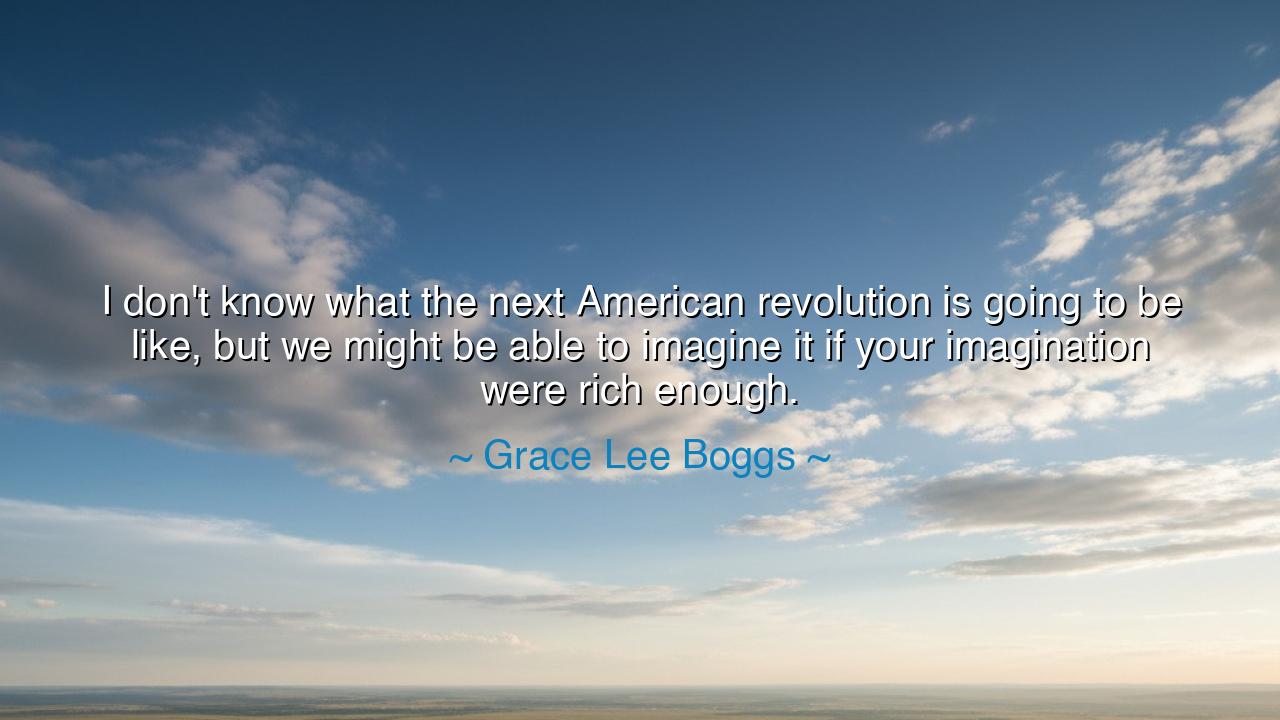
I don't know what the next American revolution is going to be
I don't know what the next American revolution is going to be like, but we might be able to imagine it if your imagination were rich enough.






The Revolution of the Imagination: The Vision of Grace Lee Boggs
Listen, O seeker of truth and change, to the words of Grace Lee Boggs, the philosopher and revolutionary of the American soul: “I don't know what the next American revolution is going to be like, but we might be able to imagine it if your imagination were rich enough.” In these words burns both challenge and prophecy — a call not to arms, but to vision. For Boggs, the true revolution does not begin in the streets or in the courts, but in the mind and heart of humankind. The imagination, she teaches, is the mother of all transformation; it is the forge in which the future is conceived before it is born.
Grace Lee Boggs, daughter of Chinese immigrants and lifelong advocate for justice, lived through the great storms of the twentieth century — the labor movements, the civil rights struggle, the women’s liberation, the rise and fall of cities and ideals. Yet she saw that each revolution, no matter how fierce or righteous, eventually turned into something that required renewal. The same people who broke chains sometimes forged new ones. Thus, she came to understand that the next revolution would not be of power, but of consciousness — not merely a changing of rulers, but a changing of hearts. And such a transformation, she said, can only be imagined before it can be built.
When Boggs spoke of a “rich imagination,” she was speaking of the creative power to envision justice beyond vengeance, community beyond competition, and humanity beyond profit. She knew that societies cannot rise higher than the dreams that shape them. The first American Revolution imagined liberty from tyranny; the next must imagine humanity beyond division. Without imagination, people repeat the same cycles of dominance and despair; with imagination, they can create what history has never seen. Thus, she teaches that revolution begins not with weapons, but with imagination rich enough to see another way of being.
Consider the life of Dr. Martin Luther King Jr., whom Boggs admired deeply. When King stood upon the steps of the Lincoln Memorial and declared, “I have a dream,” he did not speak of policies or tactics; he spoke of imagination — the ability to see a world not yet real. He called upon the people to envision the sons of slaves and the sons of slaveowners sitting together at the table of brotherhood. In that moment, imagination became a weapon more powerful than any sword. For every march, every protest, every act of courage that followed was rooted in that shared dream. The revolution of conscience began with the revolution of the mind.
Yet, Boggs’s wisdom carries a deeper challenge. To have a “rich imagination” is not to indulge in fantasy, but to train the soul to see possibility in despair. It is easy to imagine destruction; it is harder to imagine healing. It is easy to dream of overthrowing power; it is harder to dream of transforming it. She saw that many movements failed because they lacked the moral and spiritual imagination to build the world they fought for. The true revolutionary, she said, is not the one who destroys what is, but the one who envisions what can be — and then lives it, daily, with courage and compassion.
This teaching echoes the wisdom of all ages. When the Hebrew prophets dreamed of peace, when Plato imagined the ideal city, when Gandhi envisioned freedom through nonviolence, each stood upon the foundation of imagination. The world they desired did not yet exist; it was created through faith, thought, and the human will to believe. The ancients called this creative vision “divine sight” — the ability to look into the invisible realm of truth and draw from it the form of what should be. Boggs, standing in that same lineage, invites us to awaken this power within ourselves, to see not only the world that is broken, but the world that could be whole.
So, O listener, take this lesson to heart: when you dream of change, do not dream small. Expand your imagination until it includes the dignity of all people, the health of the Earth, the beauty of cooperation. Feed it with knowledge, with empathy, with art and with silence. Refuse to be satisfied with cynicism, for cynicism is the death of imagination. The next revolution — in America or anywhere — will belong not to the angry alone, but to the imaginative, those whose vision is deep enough to see humanity not as it is, but as it is meant to be.
Thus, as Grace Lee Boggs teaches, the revolution of the future begins not in battlefields or parliaments, but in the inward realm of the imagination. It is there that new worlds are born — in the quiet courage of those who dare to see the invisible, to speak the unspeakable, to love the unlovable. So let your imagination grow rich — not in fantasy, but in faith. For when enough souls begin to imagine a better world, the world itself must bend toward their vision, and a new dawn, unseen before, will rise upon the earth.






AAdministratorAdministrator
Welcome, honored guests. Please leave a comment, we will respond soon